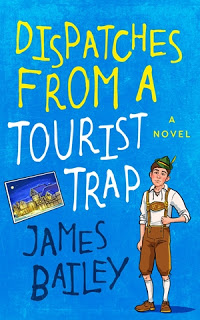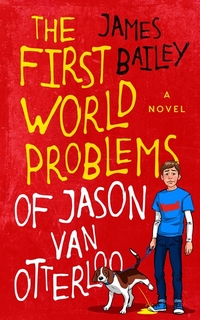 Dispatches from a Tourist Trap
Dispatches from a Tourist Trap
by James Bailey
Series: The Jason Van Otterloo Trilogy, Book 2
Kindle Edition, 253 pg.
2019
Read: April 1, 2019

Sometimes lately I feel like life is a chess match, and no matter how hard I look at the board I can’t see the next move. Or maybe I think I see it, but really I don’t. Like my pawn is sitting there, all ready to put the other king in check, and somehow my queen gets swiped and two moves later I’ve lost the game and my pawn is still waiting there, impotent and useless.
So Jason mother’s Janice continues her bad decisions when it comes to men — she leaves her husband for a new guy, who happens to be the dentist she’s started working for. We met him in The First World Problems of Jason Van Otterloo, and they clearly didn’t waste time resuming whatever it was they had back in high school. Janice has moved herself and Jason to her parents’ house, enrolled Jason in a school filled with very friendly people, and tried to move on with her life.
Jason realizes full-well that his choices are a life with his grandparents and a much smaller school, hours away from his friends and girlfriend; or life with Rob, near them. As much as he doesn’t want to be in Icicle Flats, he knows it’s the better choice available. But he complains the whole time about it — this is good for readers, Jason complaining makes for an entertaining read. This time, he’s not just complaining in emails, he’s set up a blog, too. I was wondering how the blog was going to work instead of the emails — it’s actually a really good move, allowing Jason to tell longer stories without the emails being too long.
Which is good — because he has long stories to tell this time. There’s a literature club he’s involved with at school that’s discussing books that ruffle the feathers of many, which leads to all sorts of trouble. There’s a flirtation with pirate radio. A camping trip that is fantastic to read about (and probably not a lot of fun to live through). A disastrous experiment with eBay. And basically, a bucket-load of culture shock. Also, after a few short weeks of dating, Jason’s first real relationship becomes a long-distance one. High school relationships are bad enough, throwing in a few hour bus-ride into things is just asking for trouble. So yeah, between emails and his blog — he’s got a lot to write about, and his friends have a lot to respond to. Somehow, they make it through the school year more or less intact.
Jason feels incredibly authentic — immature, self-centered, irresponsible, but he’s got his moments. He can put others before himself, do the right thing because it’s right — not to stay out of trouble; But man, he can be frustrating the rest of the time. There were a lot of opportunities along the way here for him to be a better friend, a much better boyfriend, son and grandson; and he missed almost all of them. He comes through when necessary, don’t get me wrong and he’s not a bad guy — I just wish he’d grow up a bit faster. Which again, means that Bailey has nailed his characterization, this his how people his age should be.
I’m less than thrilled with Bailey’s approach to religious characters in these two books. I’m not questioning that there are people like the characters he depicts running around everywhere and that the situations would’ve played out a lot like they did here (but some of it pushed believability). I just would like a small indication that there were some sincere people trying to do the right thing in the middle of all this.
Having talked about The First World Problems of Jason Van Otterloo just two weeks ago, it feels hard to talk about this book beyond some of the plot changes — this feels like the same book, just with new problems. Which is pretty much the point, right? I still like Jason (as frustrating as he can be), his girlfriend is fantastic, I want good things to happen to Drew. Jason’s already complicated life is about to get a lot worse, which should prove very entertaining for the rest of us. A strong follow-up in this series.
—–
![]()




